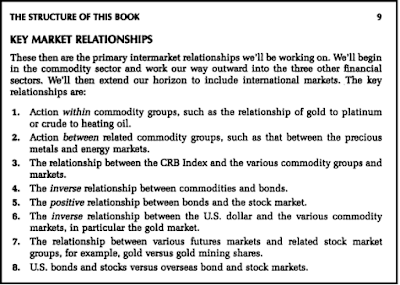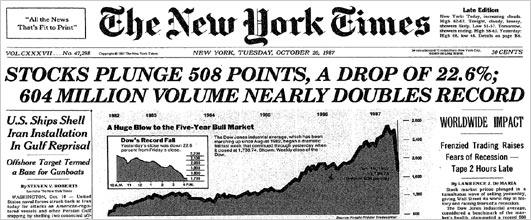Technical analysis
1. In order of importance to me are: (1) the long-term trend, (2) the current chart pattern, and (3) picking a good spot to buy or sell. Those are the three primary components of my trading. Way down in very distant fourth place are my fundamental ideas and, quite likely, on balance, they have cost me money.
2. If I were buying, my point would be above the market. I try to identify a point at which I expect the market momentum to be strong in the direction of the trade, so as to reduce my probable risk.
3. If I am bullish, I neither buy on a reaction, nor wait for strength; I am already in. I turn bullish at the instant my buy stop is hit, and stay bullish until my sell stop is hit. Being bullish and not being long is illogical.
4. I set protective stops at the same time I enter a trade. I normally move these stops in to lock in a profit as the trend continues. Sometimes, I take profits when a market gets wild. This usually doesn’t get me out any better than waiting for my stops to close in, but it does cut down on the volatility of the portfolio, which helps calm my nerves. Losing a position is aggravating, whereas losing your nerve is devastating.
5. Before I enter a trade, I set stops at a point at which the chart sours.
6. Getting back in is an essential part of trend following.
7. I don’t implement momentum, I notice it and align my trading with it.
8. The markets are the same now as they were five to ten years ago because they keep changing – just like they did then.
Risk management
9. Trading requires skill at reading the markets and at managing your own anxieties.
10. Risk is the uncertain possibility of loss. If you could quantify risk exactly, it would no longer be risk.
11. Risk control has to do with your willingness to allow your stop to do its job.
12. Speculate with less than 10% of your liquid net worth. Risk less than 1% of your speculative account on a trade. This tends to keep the fluctuations in the trading account small, relative to net worth.
13. Reliance on Fundamentals indicates lack of faith in trend following.
14. Risk no more that you can afford to lose, and also risk enough so that a win is meaningful.
15. I usually ignore advice from other traders, especially the ones who believe they are on to a “sure thing”. The old timers, who talk about “maybe there is a chance of so and so,” are often right and early.
16. Pyramiding instructions appear on dollar bills. Add smaller and smaller amounts on the way up. Keep your eye open at the top
Longer term trading
17. Having a quote machine is like having a slot machine on your desk— you end up feeding it all day long. I get my price data after the close each day.
18. Intraday trading is tough since the moves are not as big as for long-term trading and there is no comparable reduction in transaction cost.
19. In general, short-term trading systems succumb to transaction costs and execution friction.
20. Trend systems do not intend to pick tops or bottoms. They ride sides.
21. The shorter the term, the smaller the move. So profit potential decreases with trading frequency. Meanwhile, transaction costs stay the same. To compensate for profit roll-off, short-term traders have to be very good guessers. To improve guessing skills, you can practice dealing cards from a standard deck, one at a time. When you become very good at it you might be able to make money with short term trading.
Money management
22. The key to long-term survival and prosperity has a lot to do with the money management techniques incorporated into the technical system. There are old traders and there are bold traders, but there are very few old, bold traders.
23. The manager has to decide how much risk to accept, which markets to play, and how aggressively to increase and decrease the trading base as a function of equity change. These decisions are quite important—often more important than trade timing.
24. The profitability of trading systems seems to move in cycles. Periods during which trend-following systems are highly successful will lead to their increased popularity. As the number of system users increases, and the markets shift from trending to directionless price action, these systems become unprofitable, and under capitalized and inexperienced traders will get shaken out. Longevity is the key to success.
Trading a system that suits you
25. Systems don’t need to be changed. The trick is for a trader to develop a system with which he is compatible.
26. I don’t think traders can follow rules for very long unless they reflect their own trading style. Eventually, a breaking point is reached and the trader has to quit or change, or find a new set of rules he can follow. This seems to be part of the process of evolution and growth of a trader.
27. A trading system is an agreement you make between yourself and the markets.
28. Trading Systems don’t eliminate whipsaws. They just include them as part of the process.
29. A computer can follow a system and place orders without making predictions or feeling anticipation. Predictions and anticipations are objects you create. These objects may interfere with sticking to your system.
Rules to follow
30. The trading rules I live by are: (1) Cut losses. (2) Ride winners. (3) Keep bets small. (4) Follow the rules without question. (5) Know when to break the rules.
31. The elements of good trading are: (1) cutting losses, (2) cutting losses, and (3) cutting losses. If you can follow these three rules, you may have a chance.
Embrace losses
32. If you can’t take a small loss, sooner or later you will take the mother of all losses.
33. I handle losing streaks by trimming down my activity. I just wait it out. Trying to trade during a losing streak is emotionally devastating. Trying to play “catch up” is lethal.
34. (On losing streaks and over-trading) Acting out this drama could be exciting. However, it also seems terribly expensive. One alternative is to keep bets small and then to systematically keep reducing risk during equity draw downs. That way you have a gentle financial and emotional touchdown.
Mindset of a winner
35. A losing trader can do little to transform himself into a winning trader. A losing trader is not going to want to transform himself. That’s the kind of thing winning traders do.
36. The winning traders have usually been winning at whatever field they are in for years.
37. It is a happy circumstance that when nature gives us true burning desires, she also gives us the means to satisfy them. Those who want to win and lack skill can get someone with skill to help them.
38 The “doing” part of trading is simple. You just pick up the phone and place orders. The “being” part is a bit more subtle. It’s like being an athlete. It’s commitment arid mission. To the committed, a world of support appears. All manner of unforeseen assistance materializes to support and propel the committed to meet grand destiny.
39. In your recipe for success, don’t forget commitment – and a deep belief in the inevitability of your success.




























